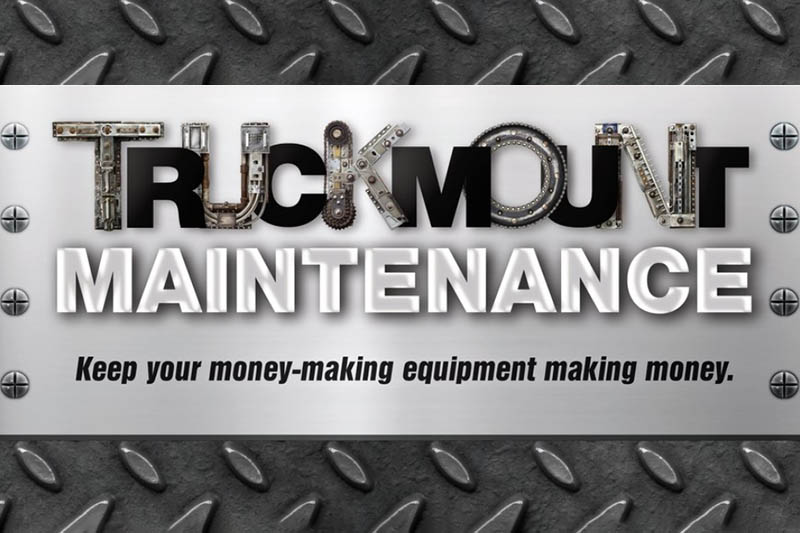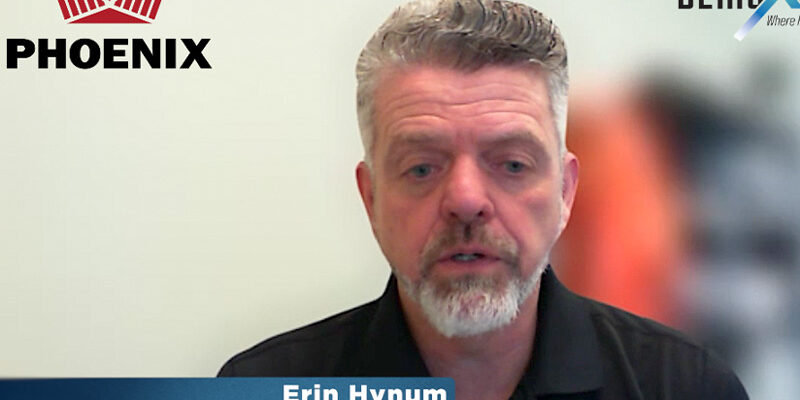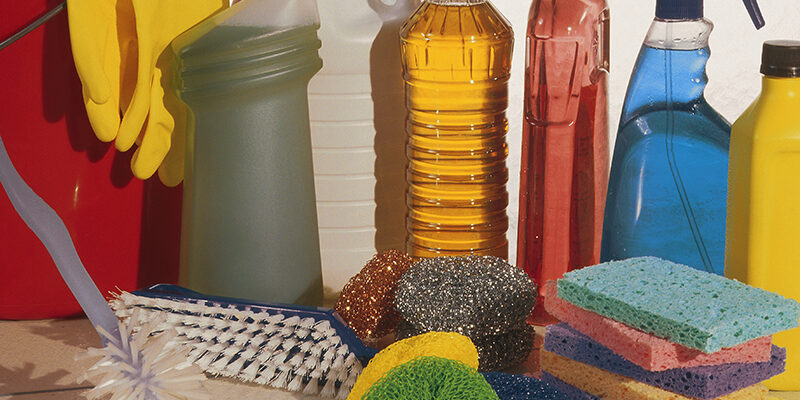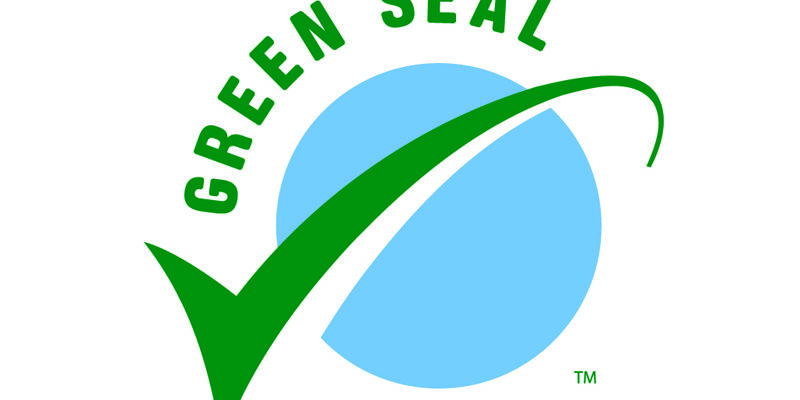The Fix for Truckmounts

By Jeff Cross
The schedule is filling up. You have a full day of work.
You arrive at the job and start your truckmount and… it starts to make a funny noise. After a minute or two, it quits entirely, with a sputter and a pop. You say a silent prayer, or maybe utter a profanity, and try again, turning the key with hope in your heart.
You know the customer is watching, and she has even moved all the furniture for you. It’s pressure time. Will your truckmount get you through the day?The starter engages, turning the engine over. It cranks and cranks… sputters and pops… but nothing happens.
So you call the manufacturer and ask for help. A mechanic gets on the telephone and asks, “What’s the problem?” The interrogation begins, and the finaldetermination of the problem is that you didn’t do something you should have done during the slow season.
That’s right. You didn’t pamper your truckmount. It needed some attention and now it’s going to get it, but at the worst possible time — when you are busy.
Beyond the basics of truckmountmaintenance
Most dedicated users of truckmounted hot water extraction machines follow through with manufacture’s recommendations to change the engine oil, appropriate filters and to perform the normal lubrication of moving parts.
This article isn’t just about the basic, routine truckmount maintenance that is done year-round. This is a collection of tips from end-users and manufacturers alike who find that “doing more” to today’s machines keeps them running in top shape, especially during the busy season that is just around the corner.
Cleanfax asked the questions. Here are the responses.
End-user anticipation
Knowing that even the best machine in the world can have issues from time to time means you have to anticipate mechanical issues and be ready for them.One way is to monitor your machine’s performance.
“Actually watch your gauges,” said Richard Johnson with Pioneer Janitorial Service in Live Oak, FL. “Hook up short lines and run it low, medium and full throttle to see if there are any spikes or drops. When you have a fined-tuned sports car, what do you watch more than people turning their heads? Your gauges! Gauges tell you everything.”
Besides gauges, Richard Smith with Modern Carpet Cleaning in Oroville, CA, suggests a regular look “under the hood”.
“Very small leaks cause corrosion. Taking a look under the hood while the machine is running is always a good idea,” Smith suggested.
As mentioned, mechanical issues and breakdowns are going to happen, eventually. That’s why Torrey Whitaker with Flooring Expressions Floor Care in Indianapolis plans well in advance for that event.
“Budget a realistic amount of money to save monthly for normal and disaster repair or maintenance,” Whitaker said. “As basic as that sounds, many cleaners don’t and then freak out when a $1,000 or more repair smacks them in the face.”
End-user protection
 Larry Lumbreras with Kolorkist Carpet Cleaning and Restoration Services in San Antonio, TX, knows that a slow death can occur to truckmounts if a specific procedure isn’t followed.
Larry Lumbreras with Kolorkist Carpet Cleaning and Restoration Services in San Antonio, TX, knows that a slow death can occur to truckmounts if a specific procedure isn’t followed.
“Descaling your truckmount regularly is a must,” he said. “Not doing so will lead to loss of pressure and heat.”
You can search the Cleanfax archives and find specific recommendations on descaling truckmounts, a maintenance issue that especially faces those working with hard water.
Besides what runs through the machine (cleaning solution), technicians might forget a very important component: The waste water that ends up in the waste tank.
Sonny Winters, owner of CFM Carpet & Upholstery Cleaners in Vashon, WA, sometimes forgets this but knows the importance now. “I think that the most forgotten about thing is the waste tank,” he said. “I keep forgetting to check mine because I use an external filter. Before I started using one, I was emptying the basket after each job and rinsing the tank out at the end of the day.” So he makes an effort to remember what can’t be seen without lifting a lid and looking — what’s percolating in that big box in your truck.
Another important protection point is in regards to cold weather. If you have ever experienced a frozen machine, you know that the initial repairs may not be all that is needed. Future problems may surface.
Jack Newcomb with Laundry Express in Canton, OH, believes in dual protection for truckmounts. “Even though mine was always garaged, I kept a remote thermometer inside the truck,” he said. “I also had a small electric heater in the van for maintaining the temperature above freezing. Brass fittings freeze before anything else.”
Richard Baldwin, owner of Expert Carpet Care in Meaford, Ontario, Canada, knows that anticipation of breakdowns can be a protection. “Always keep a spare set of belts in stock,” he advises, along with other necessary parts that may fail at the most inopportune time. Besides this, Baldwin makes an annual trek to his truckmount dealer with a list of major maintenance options that need performed.
“I do this once per year, usually in the spring,” Baldwin said. “These are all those 1,000 hour things in the manual that I would prefer done by a truckmount mechanic. It is also a chance to fix or replace some of the things you have been letting go, such as malfunctioning hour meter, gauges or valves.”
Like most of you, Baldwin “likes to spend my time working, not fixing.”
[infobox title=’Truckmount Maintenance Tips From the Manufacturers’][/infobox]
Besides end-users of truckmounts, Cleanfax asked truckmount manufacturers what they would recommend for smart spring season tune-up and preventative truckmount maintenance tips.
Analyze the following information and work hard to keep your machine in top operating condition. Keep in mind that some of the advice may be specific to certain brands and types of machines.
Mike Roden, vice president of engineering, Sapphire Scientific
We always recommend that you store your unit — as well as your tools and chemicals — in a heated garage, but we know this is not always possible. If heated storage isn’t available, we strongly recommend that you put anti-freeze in your unit. Your owner’s manual will have complete instructions.
We recommend against using a small electric heater to keep your unit from freezing. Why? Because these small units can fail, for multiple reasons.
Winter is the perfect time to do your yearly maintenance. Check your hoses, belts, air and fuel filters, spark plugs… and change as required. Clean radiator fins, too, and check the water pumping system, seals and check valves, as well as chemical pump diaphragms and pump check valves.
And when you change the engine oil, consider changing it for 10w-30 viscosity oil. It never hurts to add a fuel additive like Heet to the fuel system. This will provide better engine protection in winter temperatures.
And don’t forget to give your vehicle engine the same attention!
Lou Querin, sales manager, Cleanco Truckmounts
Blower and pump belts should be changed twice a year as preventative truckmount maintenance.
Check and replace any worn quick disconnects on high pressure solution hoses, and also pressurized solution hoses. Look for any leaks, and repair or replace leaking hoses.
Check all quick disconnects on the truckmount itself to ensure they are not leaking. Inspect all your vacuum hoses for splits or leakage, and repair or replace as needed. Make sure you clean or replace all blower protection filters, incoming water filters and waste tank filter baskets. Check waste tank gaskets to ensure proper seal on waste tanks.
Check all upholstery tools and wand valves to ensure there are no leaks, and repair as required. Is the vacuum breaker set according to manufacturer’s specifications?
Make sure that the jets on wands and tools have a correct spray pattern and that the jets are not worn. Jets should be changed twice a year on all tools.
Brent Wiegand, equipment production manager, MasterBlend
Before the busy spring cleaning season hits, it is a good time to take a few minutes and look over your equipment. This goes beyond the normal tasks of changing the oils and filters.
After the slow winter period, it is a good idea to go just a little deeper. Belts are a good place to start because a broken belt can be a show stopper. Make sure that they are not cracked or dry rotted. Also pay attention to all of the pressure hoses. Inspect them for any unusual wear or any areas that might cause a concern.
The cleaning tools are often overlooked. Make sure that the valves are free and not binding up. Connect the tools to the machine and check to make sure that they are not leaking or dripping. Be sure to do this with the water temperature set to where you would normally clean at, because sometimes the valve will not leak when cold water is used.
This is also a great time to review the maintenance chart for your specific machine. Make sure that all the recommended truckmount maintenance is performed. The cost of regular maintenance on the machine far outweighs the cost of an unscheduled breakdown and the resulting lost work.
Jerry McKillip, national service and training manager, Prochem/Century 400
If you have owned or operated a truckmount, you know there are some basic preventive truckmount maintenance steps that need to be performed to keep the truckmount running at peak performance.
Obviously, there is the customary truckmount maintenance of changing fluids, belts and fixing things that leak water and, while these are all very important, there can be other items that are overlooked.
One is oil viscosity. Depending on where you live, your truckmount operates in a variety of weather conditions, from extreme cold to extreme heat. It is important your oil viscosity or weight matches the temperatures you are operating in. Higher viscosity oils should be used in high temperature operating conditions, and lower viscosity oils should be used in cooler temperature operating conditions.
Engine speed should also be checked for proper speed, at least once a year. With the constant pulling of the throttle cable, over time the cable can stretch and this decreases the engine RPM. Ultimately this can affect engine cooling on all air cooled engines. If the engine is running at a lower RPM, the engine is working harder and the engine temperature will increase. Lower RPM will also decrease the amount of cooling air from the engine cooling fan on the front of the engine. Also, since the engine RPM is lower, it can decrease blower performance, which means that you may notice that carpet does not dry as fast.
For a water cooled engine, checking the coolant overflow bottle for the proper amount of coolant/antifreeze is critical. If the overflow bottle runs out of coolant, air can be drawn into the coolant system and this will prevent the coolant from properly circulating through the coolant system, and the engine will overheat.
Also, to make sure you are getting the proper air flow through the radiator, you should check the front of the radiator for any foreign material and bent fins. Bent fins can easily be repaired or straightened using a fin groomer available at any auto parts store.
Most water cooled engine will also have a water pump/alternator belt that is often overlooked. It’s a good idea to replace this annually at a relatively low cost, because if this belt breaks you are taking a chance at overheating the engine.
Remember, the cooler temperatures of winter will mask problems. Summer is not as forgiving. Spending some time doing a thorough check of your unit or visiting your local authorized dealer to have it inspected and truckmount maintenance performed could save you on a major issue down the line when you have lots of jobs booked.
As the saying goes: Prevention is always better than the cure!
Jeff Cross is the director of media for ISSA, parent ofCleanfax, and is an industry trainer and consultant. He can be reached at [email protected].












